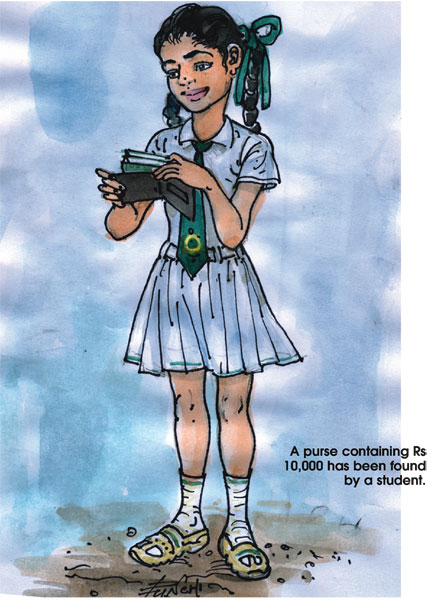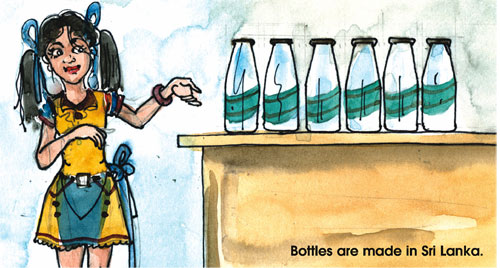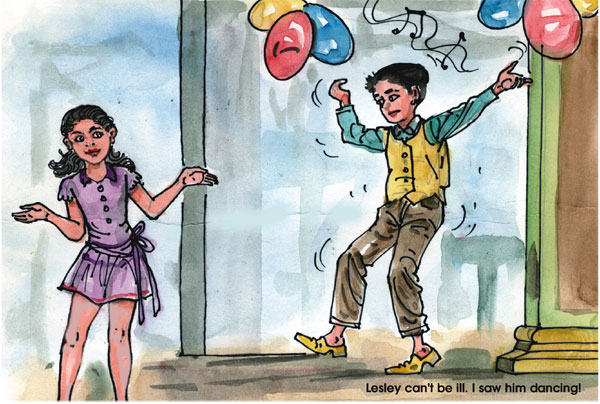|

by R. S. Karunaratne
‘By’ with passives
When we use passives, we are mostly interested in the action.
The missing soldier has been found.

French is spoken in France.
The earrings were made in the first century BC.
An elephant has been killed.
A youth has been shot dead and no one knows why.
When we want to say who or what does the action, we use ‘by.’
The missing soldier was found by the British army.
French is spoken by the people of France.
The earrings were made by a Roman goldsmith in the first century BC.
Hindi is spoken by a lot of people in India.
An elephant has been killed by a hunter.
More examples
The name of the organisation is being decided by a panel of lawyers.
The cost of university education is borne by the government.
The villagers were woken up by the loud music.
I am being taught how to use the printer by a computer instructor.
A purse containing Rs 10,000 has been found by a student.
We use ‘by’ only when it is really necessary.
A young driver has been arrested for drunk driving.
(There is no need to say ‘by the police’)
Macbeth was written by William Shakespeare.
This house was built by John Abrahams.
My car was repaired yesterday.
(There is no need to say ‘by a mechanic’)
Many English novels have been translated into Sinhala.
(There is no need to say ‘by competent translators’)
Bottles are made in Sri Lanka.
(There is no need to say ‘by glass companies’)
[Activity]
Ask questions using ‘Who ... by?’ Check your answers with the key.
1. Look at this beautiful painting. (paint)
...........................................
2. Heart of Darkness is my favourite fiction. (write)
...........................................
3. Do you remember that song “Que sera sera” ? (sing)
...........................................
4. That’s a wonderful poem. (write)
...........................................
5. Dr Zivago is a great film. (direct)
...........................................
6. The Town Hall is an impressive building. (build)
...........................................
7. I really like your name. (choose)
...........................................
8. This is a marvellous musical instrument. (play)
...........................................
9. This is a fine essay. (write)
...........................................
10. My bicycle is missing. (take)
............................................
***************

Key:
1. Who was it painted by?
2. Who was it written by?
3. Who was it sung by?
4. Who was it written by?
5. Who was it directed by?
6. Who was it built by?
7. Who was it chosen by?
8. Who was it played by?
9. Who was it written by?
10. Who was it taken by?
***************
Match words and meanings
Here’s novel way to enrich your vocabulary. Match the words in Column
‘A’ with the meanings in Column ‘B’ and check your answers with the key.
[Column A]
L 1. cannibal
... 2. cannon
... 3. cannon ball
... 4. canny
... 5. canoe
... 6. canopy
... 7. cantankerous
... 8. capable
... 9. capacious
... 10. capital punishment
... 11. capitulate
... 12. caprice
... 13. capsize
... 14. capsule
... 15. caption
... 16. captious
... 17. capture
... 18. caravan
... 19. carcass / carcase
... 20. carcinogen
... 21. cardinal
... 22. cardiograph
... 23. cardiologist
... 24. careerist
... 25. carefree
[Column B]
A. a sudden and silly wish to do something
B. to accept military defeat
C. the death penalty
D. able to contain a lot
E. able to do things effectively
F. arguing and complaining a lot
G. a cover fixed over a seat or bed
H. a small light boat pointed at both ends
I. thinking quickly and cleverly
J. a heavy metal or stone ball shot from a cannon
K. a large gun fixed to two or four wheels
L. somebody who eats human flesh
M. somebody who thinks that their career is more important than anything
else
N. a heart specialist
O. a machine for recording the heart beat
P. a priest of a very high rank in the Roman Catholic church
Q. a substance which causes cancer
R. the body of a dead animal
S. a wheeled vehicle for living or travelling
T. to take somebody as a prisoner
U. often expressing criticism about unimportant matters
V. having no problem
W. a short piece of text under a picture
X. a small container with medicine inside
Y. to turn upside down by accident on water
**************
Key:
2. K 3. J 4. I 5. H 6. G 7. F 8. E 9. D 10. C 11. B 12. A 13. Y 14. X
15. W 16. U 17. T 18. S 19. R 20. Q 21. P 22. O 23. N 24. M 25. V
**************
Starters:
How to express possibility and certainty
We use ‘may’ or ‘might’ to say that something is possible or that it
is quite likely. We use them for the present tense and the future tense.
A: Whose car is this?
B: I really don't know. It may belong to Smith.
Keep away from the strange-looking parcel. It may be a bomb.
Or: It might be a bomb.
Sandun may go to the party tomorrow.
Sandun might go to the party tomorrow.
You may / might come with me to the theatre.
The minister may / might come as the chief guest.

You may / might take a leaflet from the counter.
A: One day you may / might win a big lottery price.
B: Everyday I win only Rs 20!
We can use ‘could’ to say that something is possible.
A: Do you suspect Roy for the theft?
B: Well, he could have taken the money.
Everyone could win Rs one million.
(Possibly they will win Rs one million.)
Sometimes ‘could’ means only a small possibility.
You could marry a princess. (It is possible but not likely.)
In some situations we can use ‘may, might’ or ‘could’ to show
possibility.
It may rain tomorrow.
It might rain tomorrow.
It could rain tomorrow.
After ‘may’, might’ or ‘could’ we use ‘be’ + the progressive form of
the verb.
The policeman may be watching your movements.
The principal might be looking for you.
Father could be watching television.
The cat may be feeling hungry.
The horse might be running at a great speed.
He could be driving his car along the highway now.
Father may be working at night.
Brown could be playing tennis.
We use ‘may not’, ‘might not’ or 'mighn't’ ‘could not’ or ‘couldn't’
in the negative forms.
William may not get the job.
Samson might not come today.
He couldn't have stolen my watch.
The minister might not be in at this moment.
I might not sit the final examination this year.
We use ‘could not’ or ‘couldn't’ when something is impossible to
accomplish.
Grandfather couldn't climb the mountain because he was weak.
Must
We use ‘must’ when something is certainly true.
Nobody is answering the phone. They must be out.
I kept my bunch of keys here a little while ago. It must be somewhere.
Lalin is not at home. He must be in office.
Can't
We use ‘can't’ to say that something is impossible.
He didn't go out today. So, he can't be in office.
You can't be happy if you have to work with incompetent people.
Lesley can't be ill. I saw him dancing!
You can't be in two places at the same time.
Quiz on idioms
An idiom is a special kind of phrase. It is a group of words which
have a different meaning when used together from the one it would have
if the meaning of each word were taken individually. In the following
quiz tick the meaning you think is correct for the idiom in bold type
and check your answers with the key.
1. A stab in the back ...
(a) is an action which hurts and betrays some one
(b) is a fatal injury
(c) is a severe criticism
2. If something happens when your back is turned ...
(a) it happens suddenly
(b) it happens when you are away
(c) it happens without your knowledge
3. Back-scratching means ...
(a) to argue bitterly
(b) mutually praising each other
(c) helping somebody so that they will help you in return
4. If you bend over backwards ...
(a) you try hard to please somebody
(b) you bend your back with great difficulty
(c) you bend your back to annoy somebody
5. If you know something backwards and forwards ...
(a) you do not remember anything
(b) you do not know anything
(c) you know it very well
6. If somebody saves your bacon ...
(a) they get you out of a dangerous situation
(b) they rob you of your valuables
(c) they praise you unnecessarily
7. If something is not your bag ...
(a) you say it is yours
(b) you disclaim ownership
(c) you are not interested in it
8. If something is in the bag ...
(a) you won't get it
(b) you will get it
(c) you are not lucky
9. If you describe something as a mixed bag ...
(a) it contains things of different kinds
(b) it contains similar things
(c) it contains nothing
10. If you pack your bags ...
(a) you suddenly leave where you live or work
(b) you get ready to go on a trip
(c) you show your anger
*************
Key:
1. (a) 2. (b) 3. (c) 4. (a) 5. (c) 6. (a) 7. (c) 8. (b) 9. (a) 10. (a)
************* |

